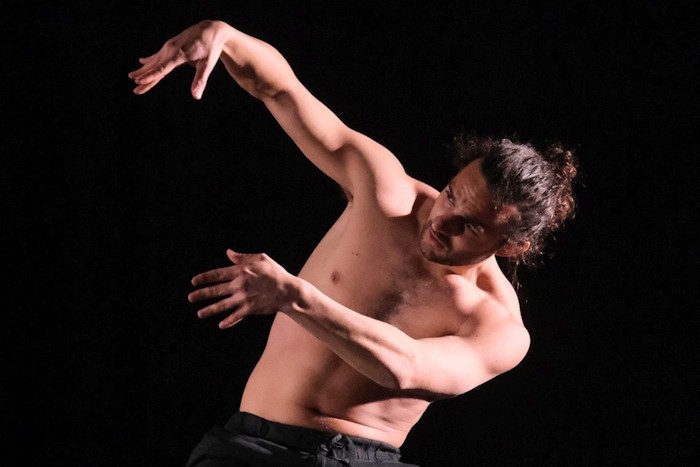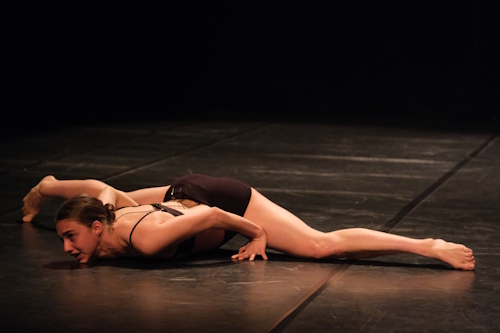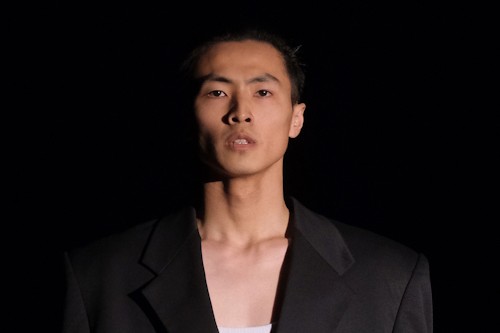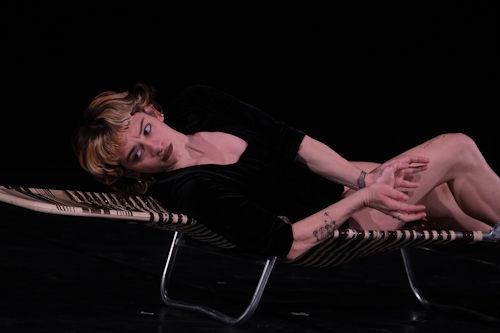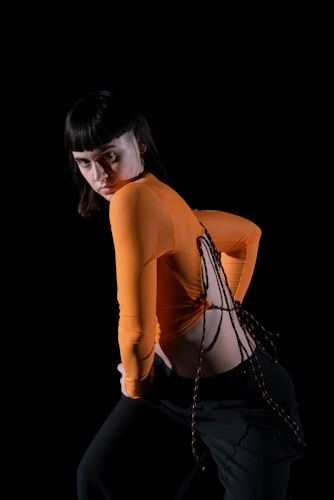Scenario Halle, Tempel Kulturzentrum, Karlsruhe
November 17, 2025
(Presented as part of Tanz Karlsruhe)
Celebrating its 30th edition in 2026, the International Solo Dance Theater Festival Stuttgart invites choreographers aged 30 or younger to present original solo works between 9 and 12 minutes long. The festival is also a competition, its winners selected by an international jury that in 2025 included Rosie Kay from the UK, getting to participate in an extensive German tour.
The six works on this year’s tour certainly live up the requirement to be “original, imaginative, unique and… display unusual achievement.” All six were danced by their creators, each providing a glimpse of their creator’s particular movement language and style, although some engaged more than others.
It was easy to see why Carmine Vigliotti (Italy) picked up First Prize for Performance with his The Space Between. He showed great stage presence, the dance illustrating well the quiet struggle of desiring something or someone that isn’t there, or perhaps is no longer there. Vigliotto was strong and powerful, yet equally moved quietly and with much grace. There was a beautiful sense of reaching out, then the frustrations of not finding what you hoped for, before surrendering to the realisation that some things are simply out of reach.
Just as impressive was Briefly by Béatrice Larrivée (Canada), who won First Prize for Choreography and Second Prize for Performance. Told through spoken word and speech, the work explores the weight and consequences of choice.
“All freedom is relative and sometimes, it’s no freedom at all,” we hear quoted from On Earth We’re Briefly Gorgeous, the debut novel by Vietnamese-American poet Ocean Vuong. There is a lot more text but Larrivée brought together the words and movement beautifully in what was a very captivating, at times poetic, always human performance. Particularly impressive was the way the latter adding layers to rather than directly illustrating the former.
“Youth is not a time of life; it is a state of mind… it is a matter of the will, a quality of the imagination, a vigour of the emotions; it is the freshness of the deep springs of life… Nobody grows old merely by a number of years. We grow old by deserting our ideals.” There’s a lot in American poet Samuel Ullman’s words, taken from his poem ‘Youth,’ the inspiration for Two Relationships by Cheng-Yang Peng, an Essen-based Taiwanese freelance dancer, who won Third Prize for Choreography.
Using a formal dark suit jacket over a white vest, Peng portrays two characters, or perhaps two sides of the same character. When wearing the jacket, we see someone stubborn and bound by rules, with it off, we find someone open, and free. He embodied neatly the traits of each, occasionally throwing in some gentle humour to make his point. Impressive too was the way he brought together movement, costume, lighting and music to make a very coherent, theatrical whole.
The evening opened with Nohow by Brussels-based, American interdisciplinary artist Charly Santagado, who won the DAF International Award (sponsored by Dance Arts Faculty, Italy) and a residency given by the Suzanne Dellal Centre for Dance and Theatre, Tel Aviv.
As with Larrivée’s Briefly, it brings together speech and movement, this time inspired by Samuel Beckett’s Ill Seen Ill Said, which speculates on human existence as it paints a haunting picture of an old woman alone in a cabin, who watches the evening and the morning star and ventures out chiefly to visit a grave.
Using an old sun lounger as a prop, Santagado questions efforts to do and perform as she muses on the potential impossibility of stillness and nonexistence. I found it difficult to connect, matters not helped by the text, presumably important, being difficult to hear clearly when she faced away from the audience and when drowned by the music.
Elsewhere, finalist Marina López from Spain performed Dime si con eso vale (Tell me if that’s okay), in which she explores physical and mental exhaustion. It essentially involves much collapsing to the floor, getting up, only to fall again. That there was a struggle going on as she attempted to resist the inevitability of what was happening was clear, but the notion of “confronting the pressures of an oppressive system” remained rather buried.
Finally, it was easy to see why Maria Antunes from Portugal picked up the Public’s First Choice Prize with her Pantera (Panther). Easy on the eye and sensual, the choreography made great use of her mobile torso and snake-hips. Quite free and celebratory in many ways, but still controlled, it was really well performed, Antunes also making frequent eye contact with those watching.

